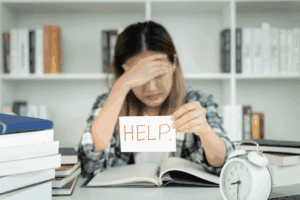Here are the Top 5 Strategies from Dr. David Crumpacker to help with your depression this year:
Make sure to seek the right help.
This year you don’t need to struggle alone with your depression. So many providers in the DFW Metroplex guide mental health, but the question with so many options is, WHO do I seek help from?
When looking for a provider, it is essential to understand that it will take time, no matter who you see. For example, it will take several visits to a therapist or seeing many different therapists before finding the right one. The same goes for seeing a psychiatrist. Remember, change won’t happen overnight, and it is essential to find someone who is aligned with your goals and will listen to you.
Make sure not to rely on medication alone. There are numerous treatment options for Depression, and finding a provider that uses a comprehensive treatment approach is critical. Offices like Smart Health and Wellness Centers are the right places to start.
Set SMART goals weekly for yourself.
Setting SMART health goals is critical to a positive recovery. SMART stands for Specific, Measurable, Achievable, Relevant, and Time-based. Depression recovery takes time and commitment and can feel overwhelming sometimes. Therefore, it is essential that we set realistic and SMART goals for ourselves to accomplish weekly.
Setting weekly SMART goals will help you keep some structure to your health goals and give you some small victories along the path to reaching your more significant mental health goals! This makes getting your end goals even more rewarding.
Make sure to take time for yourself weekly.
Time away from the stress of everyday life is incredibly important. But could you set goals to get away from it all and make time for yourself? Meditation, mindfulness practices, and massages are great relaxing activities to start doing daily, weekly, or monthly.
This doesn’t have to be an activity you have to do every day but make it a priority to step away and give yourself 15-20 minutes of relaxation a week. There has been clinical evidence to show that Meditation can increase the grey matter around your hippocampus. Research has told us that people with recurrent depression tend to have a smaller hippocampus.2
A healthy start with a better diet and exercise.
Diet and exercise are two essential components of our overall mental health. Repeatedly you will hear the Therapist and Psychiatrist review the importance of these two central self-care habits. But where do you start?
At the beginning of every year, gyms are packed to max capacity, and fab diets rule social media posts. Of course, these aren’t bad things to try, but we want to ensure our goals and strategies stay with us throughout the year.
We don’t need to join a fancy gym to get the exercise we need. A good goal is taking a 30-minute walk around your neighborhood three times a week. According to clinical research doing 30 minutes of exercise 3-5 times a week can help to lower depression symptoms.1 Once you master the 30-minute walk, you can continue to add extra exercises to your workout. Long-term exercise is crucial to improving your mental health, so you must find an activity you enjoy.
Regarding diets, we don’t have to change our lifestyles or invest in an expensive diet plan. Eating a high intake of fruit, vegetables, whole grain, fish, olive oil, low-fat dairy, and antioxidants have been shown to decrease the risk of depression.3 Remember to keep everything in moderation and drink plenty of water. (Food Allergy testing, as directed by Physician)
To build on a good foundation, try setting smaller, weekly goals instead of lofty long-term goals. An example would be replacing it with an assortment of fruits and vegetables instead of buying snack food this week. Remember, when it comes to a balance and long-term diet, take steps to improve each week, and don’t try to jump all in on Day 1.
Get Connected Again
Often when battling depression and anxiety symptoms, getting out of the house can be a challenge. So this year, challenge yourself to get connected with social activities again. Here are some things to get you out of the house:
- Things that you used to enjoy doing!
- Get back to doing your hobbies that bring joy to your life. Things like gardening, sports, hiking, cooking or baking, playing an instrument, drawing or painting, or photography. There are lots of fun local events and experiences associated with your hobbies for you to participate in.
- Volunteer
- Find your local charity to volunteer! Something that you have a passion for may need your help this year. Getting out of the house and working for an organization that helps people or animals is a great way to boost your mood this week. Someone must play with all those cute puppies and kittens this week, so why not you?
- Events with Friends or Family
- Another great way to reconnect and get out of the house is with the people you are closest to. Catch a movie with the family, go bowling, or visit your local zoo/museum. Try to be your local tourist this weekend, and you will be amazed at the things you can find to do in DFW.
We hope these five strategies can help your depression symptoms and kick off your new year in the right direction.
Dr. David Crumpacker and the TMSNS Treatment Team
References:
- Staff, M. C. (Ed.). (2017, September 27). Depression and anxiety: Exercise eases symptoms. Retrieved January 9, 2019, from https://www.mayoclinic.org/diseases-conditions/depression/in-depth/depression-and-exercise/art-20046495
- Godman, H. (Ed.). (2013, November 06). Adopt a Mediterranean diet now for better health later. Retrieved January 9, 2019, from https://www.health.harvard.edu/blog/adopt-a-mediterranean-diet-now-for-better-health-later-201311066846
- Tello, M. (Ed.). (2018, February 22). Diet and depression. Retrieved January 9, 2019, from https://www.health.harvard.edu/blog/diet-and-depression-2018022213309
See If TMS Therapy Is Right For You
Schedule Your Consultation Today


